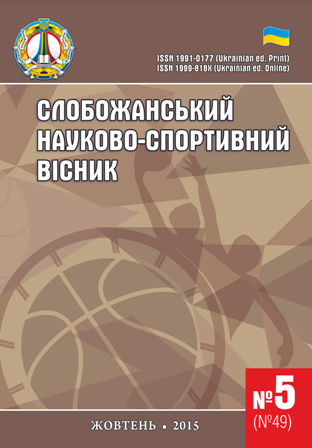Improving the training process of highly skilled bodybuilders in the preparatory period, general preparatory phase
DOI:
https://doi.org/10.15391/snsv.2015-5.019Keywords:
General preparatory stage training process, qualified bodybuilder, muscular component, the optimum methodAbstract
Purpose: to improve the method of training highly skilled bodybuilders. Material and Methods: the study involved eight highly skilled athletes, members of the team of Ukraine on bodybuilding. Results: comparative characteristics of the most commonly used methods of training process in bodybuilding. Developed and substantiated the optimal method of training highly skilled bodybuilders during the general preparatory phase of the preparatory period, which can increase body weight through muscle athletes component. Conclusions: dynamic load factor to raise the intensity of training loads allows orientation help to increase volumes shoulder musclesReferences
Konnors E., Grimkovski P., Kimber T., Mak-Kormik M. Bodibilding : balans krasoty i zdorovya [Bodybuilding: a balance of beauty and health], Moscow, 2000, 174 p. (rus)
Brungardt K. Idealnyye myshtsy grudi i plechevogo poyasa [Perfect muscles of the chest and shoulder area], Minsk, 2004, 208 p. (rus)
Bunak V. V. Antropometriya [Anthropometry], Moskva, 1941, 376 p. (rus)
Veyder B., Veyder D. Klassicheskiy bodibilding: sovremennyy podkhod «Sistema Veyderov» [Classic bodybuilding: a modern approach "system Vader"], Moscow, 2003, 432 p. (rus)
Dzho Uayder. Sistema stroitelstva tela [System construction body], Moskva, 1991, 112 p. (rus)
Dalavye F. Anatomiya silovykh uprazhneniy dlya muzhchin i zhenshchin [Anatomy of strength training for men and women], Moscow, 2006, 152 p. (rus)
Dzhim V. Yu., Adamenko M. І. Slobozans’kij nauk.-sport. visn. [Slobozhanskyi science and sport bulletin], Kharkіv, 2013, vol. 5(38), pp. 86–99. (ukr)
Dzhim V. Yu. Cherez fizicheskuyu kulturu i sport k zdorovomu obrazu zhizni : materialy І Mezhdunar. nauch.-prakt. konf. [Through physical training and sport for a healthy lifestyle: Materials of I Intern. scientific and practical. Conf.], Ufa, 2014, pp. 373–376. (rus)
Samsonova A. V. Gipertrofiya skeletnikh myshts cheloveka [Human skeletal muscle hypertrophy], Saint Petersburg, 2011, 203 p. (rus)
Menttser M. Supertrening [Supertrening], Media
sport, 1998. (rus)
Kennedi R. Krutoy kulturizm [Cool Bodybuilding], Moscow, 2000, 224 p. (rus)
Shenkman B. S. Vliyaniye trenirovki na kompozitsiyu myshts, razmery i okislitelnyy potentsіal myshechnykh volokon u cheloveka : avtoref. dis. … k. b. n. [Effect of exercise on muscle composition, size and potentsіal oxidative muscle fibers in humans : PhD thesis], Moscow, 1990, 22 p. (rus)
Kots Ya. M. Fiziologicheskaya i biokhimicheskaya kharakteristika skorostno-silovykh i slozhnokoordinatsionnykh sportivnykh uprazhneniy [Physiological and biochemical characteristics of speed and power, and coordination is difficult Exercise], Moscow, 1976, pp. 34–39. (rus)
Oleshko V. G. Pіdgotovka sportsmenіv u silovikh vidakh sportu : navch. posіb. dlya vuzіv [Training athletes in power sports], Kyiv, 2011, 444 p. (ukr)
Shvartsenegger A., Dobbins B. Entsiklopediya sovremennogo bodibildinga. T. 1 [Encyclopedia of Modern Bodybuilding. T. 1], Moscow, 1993, 160 p. (rus)
Borisov D. Fit4life.ru, Access mode : fit4life.ru. (rus)
Downloads
Published
How to Cite
Issue
Section
License
Copyright (c) 2015 (Olexandr Tyhorskyy) Тихорський Олександр Анатолійович

This work is licensed under a Creative Commons Attribution 4.0 International License.
Our publications make use of copyright CREATIVE COMMONS open access journals.
Authors published in this journal agree to the following terms:
1 The authors reserve the right of authorship of the work and pass the journal right of first publication of this work are licensed under the Creative Commons Attribution License, which allows others to freely distribute the published work with reference to the authors of the original work and the first publication of this magazine.
2 The authors have the right to enter into separate agreements for additional non-exclusive distribution of work in the form in which it was published the magazine (such as work place electronic repository institution or publish as part of the monograph), provided that the reference to the first publication of this magazine.

 Attention, authors!
Attention, authors!


